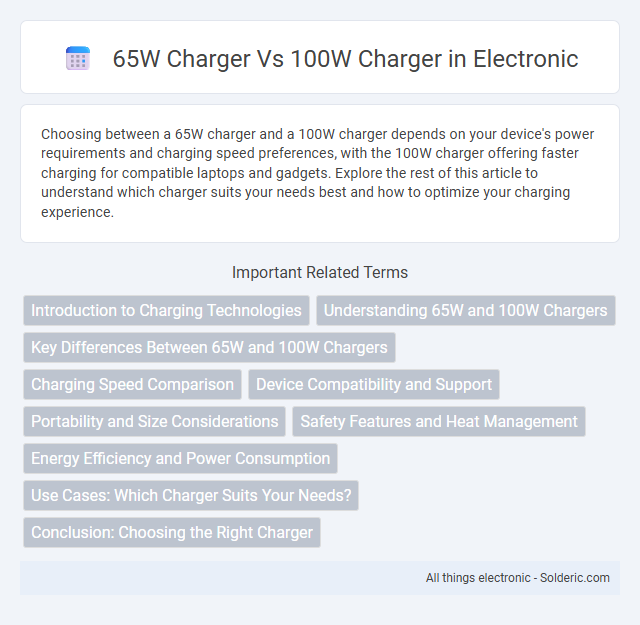Choosing between a 65W charger and a 100W charger depends on your device's power requirements and charging speed preferences, with the 100W charger offering faster charging for compatible laptops and gadgets. Explore the rest of this article to understand which charger suits your needs best and how to optimize your charging experience.
Comparison Table
| Feature | 65W Charger | 100W Charger |
|---|---|---|
| Power Output | 65 Watts | 100 Watts |
| Charging Speed | Medium-fast charging | Fast charging, ideal for larger devices |
| Device Compatibility | Smartphones, tablets, most laptops | High-performance laptops, gaming devices, power-hungry gadgets |
| Portability | Compact and lightweight | Bulkier due to higher capacity |
| Heat Emission | Lower heat generation | Higher heat generation, may require cooling |
| Price | Generally more affordable | Typically more expensive |
| Best Use Case | Everyday devices, moderate charging needs | Power-intensive devices, quick top-ups |
Introduction to Charging Technologies
65W chargers typically use USB Power Delivery (USB PD) 3.0 technology, providing efficient power management for smartphones, tablets, and most laptops. In contrast, 100W chargers leverage advanced USB PD 3.1 protocols, enabling higher wattage delivery suited for power-hungry devices like gaming laptops and large ultrabooks. Both chargers incorporate smart voltage regulation and thermal protection to ensure device safety and optimal charging speeds.
Understanding 65W and 100W Chargers
65W chargers provide sufficient power for most laptops, smartphones, and tablets, delivering fast charging without excessive heat generation. 100W chargers support higher power devices and enable quicker charging times, especially for power-hungry laptops and USB-C PD-enabled gadgets. Choosing between 65W and 100W chargers depends on device compatibility, charging speed preferences, and portability needs.
Key Differences Between 65W and 100W Chargers
A 65W charger provides sufficient power for most smartphones and laptops, delivering faster charging speeds than lower-wattage options. In contrast, a 100W charger supports quicker charging for high-demand devices like gaming laptops and power-hungry tablets, enabling rapid battery replenishment. Your choice depends on device compatibility and charging speed needs, as higher wattage can optimize performance without risking damage when matched correctly.
Charging Speed Comparison
A 100W charger delivers significantly faster charging speeds than a 65W charger, especially for devices with large batteries like laptops and high-capacity smartphones. For instance, a 100W charger can charge a 5000mAh smartphone battery from 0% to 50% in approximately 20 minutes, whereas a 65W charger may take around 30 minutes for the same charge level. The higher wattage allows more power to be delivered quickly, reducing overall charging time and enhancing user convenience.
Device Compatibility and Support
A 65W charger typically supports a wide range of smartphones, tablets, and ultra-portable laptops, making it ideal for everyday use with most mid-range devices. A 100W charger is designed to handle high-power devices like gaming laptops, larger ultrabooks, and some professional equipment, ensuring faster charging and compatibility with more demanding hardware. You should check your device's power requirements and manufacturer recommendations to ensure optimal compatibility and avoid potential damage.
Portability and Size Considerations
A 65W charger typically offers a more compact and lightweight design, making it easier to carry and ideal for travel or daily commuting. In contrast, a 100W charger, while delivering faster charging speeds, is generally bulkier and heavier, potentially reducing portability. Choosing the right charger depends on your need for speed versus convenience in size and weight.
Safety Features and Heat Management
A 65W charger typically incorporates advanced safety features such as over-current, over-voltage, and short-circuit protection to ensure device safety while operating within moderate power limits. A 100W charger demands enhanced thermal management technologies, including better heat dissipation materials and smart temperature control systems, to prevent overheating during higher power output. Both chargers prioritize safety, but the 100W charger employs more robust cooling mechanisms to maintain performance and reliability under heavier loads.
Energy Efficiency and Power Consumption
A 65W charger generally consumes less power and offers higher energy efficiency for everyday charging needs, reducing your overall electricity usage. A 100W charger delivers faster charging but may draw more power and generate additional heat, potentially impacting energy efficiency. Choosing the right charger depends on your device's power requirements and how you balance speed with energy consumption.
Use Cases: Which Charger Suits Your Needs?
A 65W charger is ideal for everyday tasks like charging smartphones, tablets, and lightweight laptops, offering a balance of fast charging and portability. A 100W charger is better suited for power-hungry devices such as gaming laptops, professional workstations, or for users who require faster charging speeds to minimize downtime. Evaluate your device's power requirements and usage patterns to determine which charger best fits your lifestyle and ensures optimal performance.
Conclusion: Choosing the Right Charger
A 65W charger provides sufficient power for most laptops and smartphones, delivering efficient charging speeds without excessive energy consumption. A 100W charger is ideal for high-performance devices such as gaming laptops or those requiring faster charging and power delivery for multiple peripherals. You should choose a charger that matches your device's power requirements to ensure optimal charging speed and device safety.
65W charger vs 100W charger Infographic

 solderic.com
solderic.com